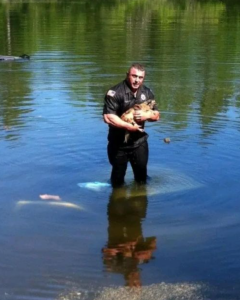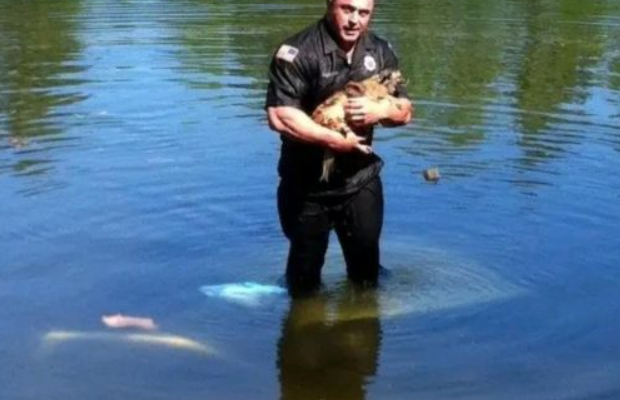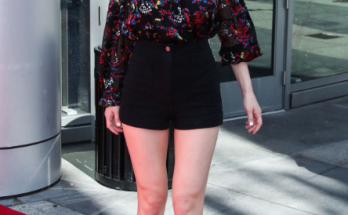The Day Courage Jumped Into the Water
It was one of those heavy summer afternoons when the air feels too thick to breathe. The river that cut through town glistened under the sun, its current lazy on the surface but treacherous beneath. People had gathered along the banks, children with dripping popsicles, parents with folding chairs, teenagers daring each other to leap from the rocks. The river had always been both playground and predator. Everyone respected its mood—everyone except the stranger who slipped.
It happened quickly. A boy, maybe ten years old, leaned too far over the edge to watch a fish dart beneath the reeds. His foot caught on a slick patch of moss, and in an instant, he was gone. The crowd gasped as a splash shattered the afternoon calm. For a heartbeat, silence followed, broken only by the rippling current pulling the boy farther from the bank.
No one moved.
Some shouted for help, others pointed, but fear rooted most of them to the ground. Parents clutched their own children tighter, calculating risk versus instinct. The boy thrashed, water swallowing his cries. His small arms slapped the surface, desperate for air.
And then—it happened.
From the far side of the bank, a figure leapt. No hesitation, no pause for thought. A girl, no older than seventeen, tore off her shoes mid-run and launched herself into the river like an arrow. Her name was Maya, though most people that day didn’t know it yet. To them, she was only “the one who jumped.”
The water swallowed her whole.
Gasps erupted, then frantic murmurs. A man shouted, “The current’s too strong!” Another added, “She won’t make it!” But their words meant nothing—Maya was already moving, her arms cutting through the waves. The river roared louder as if testing her resolve, dragging her under, spitting her out again.
The boy vanished beneath the surface. Maya dove after him, lungs burning, eyes stinging in the murky depths. She groped through the shadows until—there—she caught a flailing wrist. He was heavier than she imagined, waterlogged and terrified, but she locked her grip and kicked hard toward the light.
They surfaced together, the boy coughing, clinging to her with wild panic. “It’s okay!” she shouted above the rush of water, though her own chest screamed otherwise. “Hold on to me. Don’t fight it.”
The crowd erupted in shouts of encouragement now, but none of them dared step in. They watched as she fought the current inch by inch, her strokes slowing, her face tightening with exhaustion. The river, relentless, tried to claim them both.
A rope appeared on the bank, thrown by an older fisherman who finally broke free from the paralysis of fear. “Grab it!” he yelled. Maya angled herself, kicking furiously until her fingers grazed the rough coil. She wrapped it around her wrist and screamed for the boy to hold on. With every tug, the fisherman and two others dragged them closer, the river unwilling to surrender its prey.
At last, they collapsed on the muddy shore, lungs heaving, arms trembling. The boy’s sobs filled the air, mingling with the stunned silence of the onlookers.
The crowd surged forward, voices overlapping—praise, relief, disbelief. But Maya lay flat, chest rising and falling, her eyes fixed on the sky. She didn’t hear the applause or the whispers of “hero.” She only felt the ache in her muscles and the strange stillness that comes after chaos.
The boy’s mother fell to her knees beside Maya, clutching her rescuer’s hand with tears streaming down her face. “You saved him,” she whispered. “You saved my son.”
Maya finally sat up, brushing soaked hair from her face. Her lips curved into the smallest of smiles. “Anyone would have,” she murmured. But deep down, she knew not everyone would have. She had seen the hesitation in their eyes, the weight of fear keeping them frozen. She had felt the moment when choice hung in the air—jump, or stand still—and she had jumped.
The Ripple Effect
News of the rescue spread fast. By evening, everyone in town knew about the girl who had leapt into the river without thinking twice. The local paper called it “an act of extraordinary courage.” Neighbors stopped by her house with flowers, pies, and grateful words. Strangers nodded at her in the street, their eyes filled with admiration.
But Maya struggled with the attention. She hadn’t done it for glory, and she didn’t feel heroic. In her mind, she replayed the boy’s terrified eyes, the crushing pull of the current, the moment she almost slipped under with him. What if she hadn’t reached him in time? What if they had both gone under? Those questions lingered in the quiet hours, louder than any praise.
Yet something shifted in the community. The bystanders who had frozen that day began to reflect on their own choices. Parents talked to their children about bravery, not as the absence of fear but as action in spite of it. The fisherman who threw the rope admitted that Maya’s leap had jolted him awake. “I realized I was waiting for someone else to do what I could have done,” he confessed. “That day changed me.”
Maya’s Own Reflection
Late at night, when the house was quiet, Maya sat by her window and stared at the darkened river winding through town. She thought about courage—what it was, what it cost. People liked to imagine it was something shining and unshakable, but she knew it was messy, frightening, and heavy with doubt.
She remembered the moment before she jumped: the pounding in her chest, the brief flash of fear that she might never come back. But in that same heartbeat, another voice had risen, louder than fear. If you don’t go, he will die. That was all it took.
Courage, she realized, was not about being fearless. It was about deciding that someone else’s life mattered more than your fear.
Years Later
The boy she saved never forgot her. Seven years later, now a teenager himself, he spoke at his school about the day courage jumped into the water. He told his classmates that his life had been given back to him by a girl who didn’t stop to think about herself. “Because of her, I had a chance to grow up,” he said. “Courage isn’t something far away. It’s a choice—one we can all make.”
In the crowd that day, Maya listened quietly, a proud but humble smile on her face. She had grown older, wiser, and still uneasy with the word “hero.” But she realized the river had taught her something enduring: that courage doesn’t wait for perfect conditions. It leaps, even when the water looks dark.
Conclusion
The day courage jumped into the water wasn’t just about saving one boy—it was about awakening something in everyone who witnessed it. Courage rippled outward, touching lives far beyond the riverbank. It reminded people that bravery is not found in speeches or medals but in the moment someone decides to act.
For the boy, it meant life.
For the town, it meant a new understanding of responsibility.
For Maya, it meant carrying the truth that courage doesn’t always roar. Sometimes, it simply jumps—without looking back.


